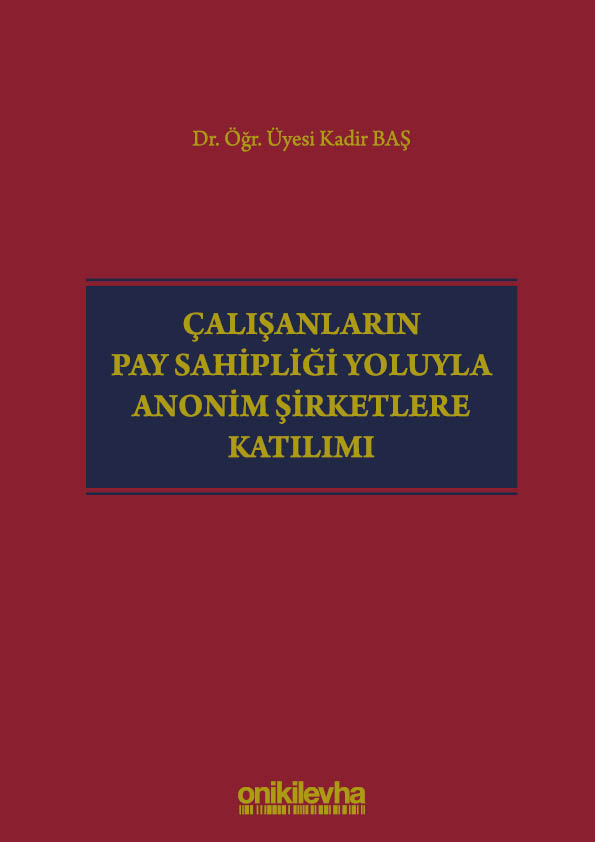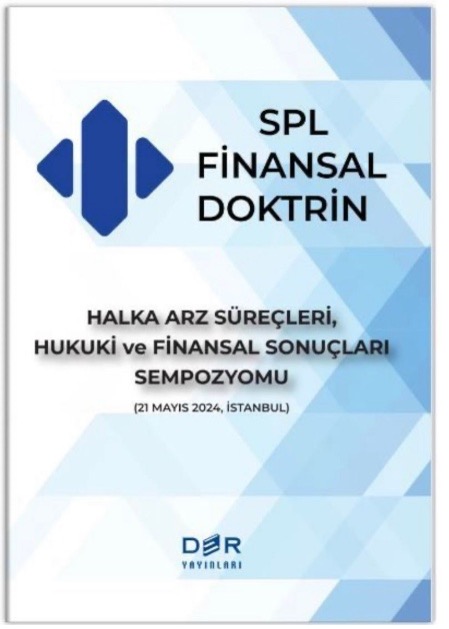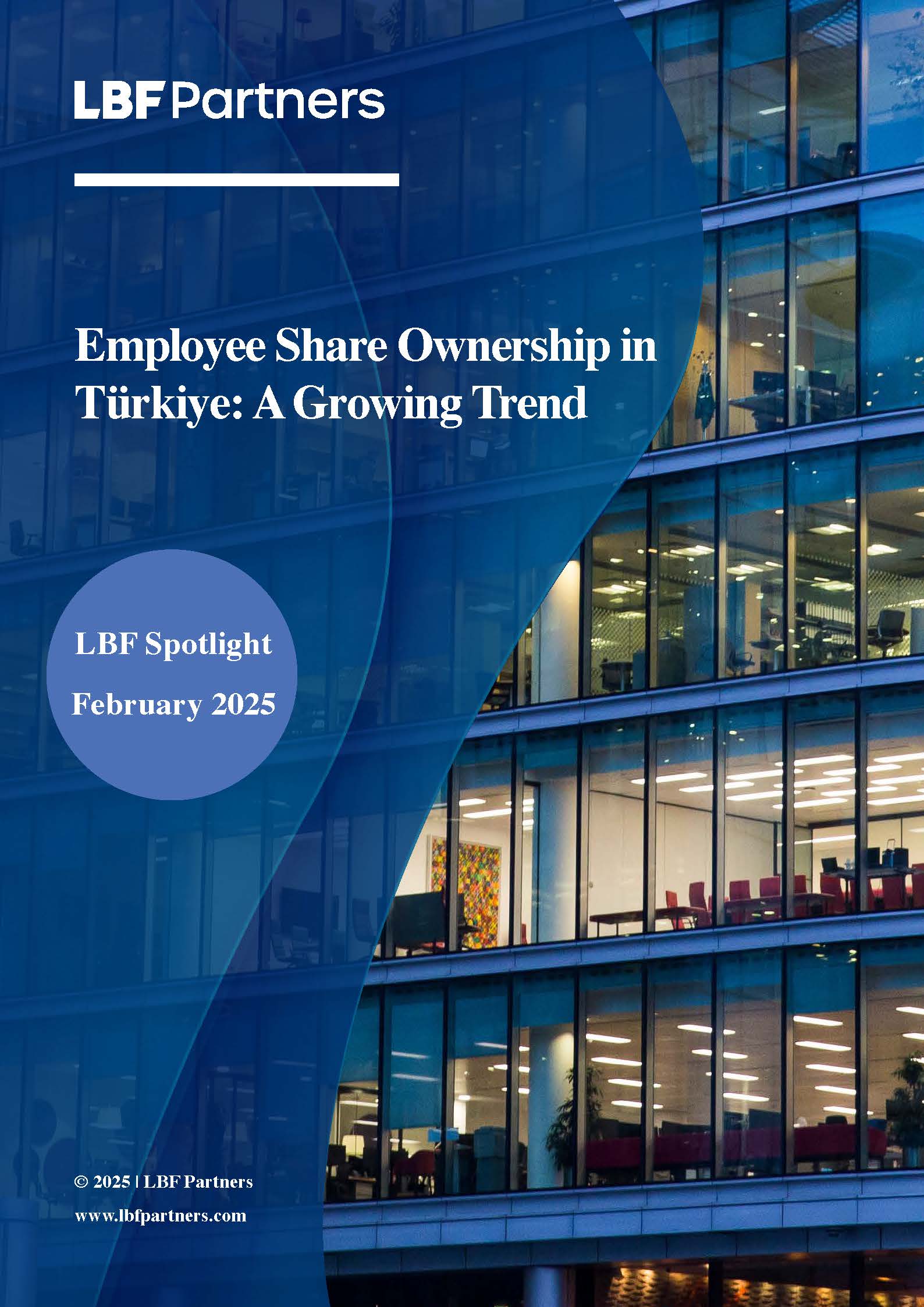Employee Share Ownership in Türkiye: A Growing Trend
Employee share ownership is widely common in the United States (“US”) and Europe. In the US, where there is a long-standing culture of employee share ownership programs supported by tax incentives, approximately 18% of employees have some form of ownership stake in the company where they work by 2021[1]. According to European Federation of Employee Share Ownership (EFES), by 2023, 95% of large European companies have employee share ownership[2].
There is no comprehensive statistical study on the current state of employee share ownership in Türkiye. However, it is apparent that Türkiye is significantly behind the US and Europe in terms of employee share ownership. This may be attributed to several factors, including the relatively limited number of publicly held companies, a lack of awareness regarding the benefits of employee share ownership, and inadequate legislations encouraging employee share ownership.
That said, employee share ownership practices have recently gained some popularity among Turkish companies. In parallel with this trend, governmental efforts to promote employee share ownership in Türkiye have also recently increased. In the 2021 Presidential Annual Program, the Ministry of Treasury and Finance and the Capital Markets Board of Türkiye were tasked with reviewing the legislation on employee share ownership programs. In August 2024, Law No. 7524 amended Income Tax Law No. 193 (“ITL”) to introduce a tax exemption for the transfer of shares by the employers to its employees.
"In August 2024, Law No. 7524 amended Income Tax Law No. 193 (“ITL”) to introduce a tax exemption for the transfer of shares by the employers to its employees."
This LBF Spotlight sheds light on the recent developments regarding employee share ownership in Türkiye and the legal framework governing them.
Types of Employee Share Ownership Practices
In the US and Europe, companies generally grant employees the right to acquire shares through a systematic, long-term plan, targeting a broad employee base. Similar employee share ownership plans have also started to emerge in Türkiye. However, in Turkish practice, it is more common for companies or their controlling shareholders to grant shares or share options to employees on an individual basis, without a systematic plan.
Employee share ownership practices may also differ based on the rights granted to employees. In some cases, companies commit to directly granting shares to employees who meet certain conditions, while in other cases, they grant employees the option to purchase company shares, either with or without a discount. In practice, there are also instances where employees are provided with both shares and share options at the same time.
Companies or controlling shareholders may refrain from granting shares to their employees due to the risk of those employees using the managerial rights granted by the shares as leverage against the company. To address this concern, companies often choose to implement “phantom stock” or “shadow stock” plans to grant their employees financial rights tied to the company’s shares without actually transferring ownership of any shares. This allows companies to offer some of the benefits of share ownership to employees while mitigating the associated risks.
Employee Share Ownership Practices by Multinational Corporations in Türkiye
It is common for multinational corporations to include employees of their Turkish subsidiaries in their global employee share ownership programs. Those practices may even be more established and widespread than those conducted by Türkiye-based companies.
In employee share ownership programs run by multinational corporations, employees of Turkish subsidiary are usually offered shares in the parent company located abroad. However, since those commitments are made to employees in Türkiye, they are subject to Turkish labour law. The Turkish Revenue Administration has accepted that the benefits received by the employees will be taxed in accordance with the ITL if the employees of the Turkish subsidiary are given free shares as part of the share ownership plan implemented by a group company abroad[3]. As explained below, this approach has also been confirmed by the secondary regulation adopted following Law No. 7524.
Startups in Digital Markets and Employee Share Ownership
The recent rise in employee share ownership in Türkiye may largely be attributed to the increasing number of start-ups in digital markets. While these start-ups often have innovative ideas or projects with the potential for success, they typically lack the financial resources to hire the qualified employees needed to bring those ideas to fruition. To convince qualified employees to work for lower salaries, such companies often offer them share ownership in the company. Employee share ownership plans thus not only support the success of new ventures but also contribute to the emergence of technological innovations and a competitive market structure.
Legal Methods for Providing Employee Share Ownership
There are three different legal methods that may be used by companies in providing shares to their employees.
The first and the most commonly used in practice is the transfer of the company's own shares, held by the company or its controlling shareholder, to employees- either free of charge or at a discount, or at fair value. In order for the company to apply this method, it must first acquire the shares in question. Turkish Commercial Code No. 6102 (“TCC”) does not include a special exception that facilitates the company’s acquisition of its own shares for the purpose of providing shares to employees. The Communiqué on Buy-Back Shares No. II-22.1, applicable to publicly held companies, provides some exceptions to ease the company's acquisition of its own shares for the implementation of employee share ownership programs. It should be noted that, despite those exceptions, the acquisition of own shares by publicly held companies for employee share ownership programs is to stricter conditions compared to non-publicly held companies.
The second method of providing employees with shares is the subscription by employees of new shares issued through a capital increase. Under Article 462/2 of the TCC, employee participation is explicitly cited as a justification for limiting the pre-emptive rights of the shareholders, in order to encourage employee share ownership. However, this method is not widely used by companies in practice.
The third method is the conditional capital increase. In this method, regulated under Article 463 et seq. of the TCC, employees acquire new shares in the company by exercising the share options previously granted to them. Although the conditional capital increase seems to be the most convenient method for employee share ownership plans, it is not commonly used by non-publicly held companies. However, there are some examples of publicly held companies providing shares to their employees in accordance with Article 17 of the Communiqué on Shares No. VII-128.1, which governs conditional capital increases for publicly held companies[4].
Share Acquisitions by Employees in Initial Public Offerings
The leverage of employees using their shareholding as leverage against the company becomes insignificant after the initial public offering (“IPO”) during which many investors acquire the company's shares. Companies, therefore, may choose to use the IPO as an opportunity to take advantage of the benefits of employee share ownership. In fact, it has recently become common for Turkish companies to make specific allocations to employees during IPOs. The number of IPOs between 2022 and 2024 in which company employees were identified as a separate investor group and received specific allocations is as follows:
| 2022 | 2023 | 2024 | Total | |
| Total number of IPOs | 38 | 56 | 33 | 127 |
| Number of IPOs including specific allocations to employees | 4 | 18 | 7 | 29 |
| Ratio | 10,5% | 32,1% | 21,2% | 22,8% |
Information regarding the number of shares acquired by employees in IPOs, in which specific allocations are made to employees, is as follows:
| 2022 | 2023 | 2024 | Total | |
| Total distributed lots (in thousands) | 103.038.000 | 1.485.879.789 | 515.755.875 | 2.104.673.664 |
| Those distributed to employees (in thousands) | 987.393 | 58.699.571 | 4.117.298 | 63.804.262 |
| Ratio | 0,94% | 3,95% | 0,8% | 3% |
Although the number and ratio of IPOs providing specific allocations to employees, as well as the ratio of shares acquired by employees, peaked in 2023 and slightly declined in 2024, there appears to be an ongoing trend of using IPOs to provide employee share ownership.
"Although the number and ratio of IPOs providing specific allocations to employees, as well as the ratio of shares acquired by employees, peaked in 2023 and slightly declined in 2024, there appears to be an ongoing trend of using IPOs to provide employee share ownership."
A specific allocation of shares to employees during an IPO may give them a significant price advantage if the value of the company’s shares increases after the IPO. However, the primary incentive for employees to purchase shares in the IPO may be the discounted price offered to them. Pursuant to Article 27 of the Communiqué on Sales of Capital Market Instruments (No. II-5.2), a discount of up to 20% may be applied to certain investor groups, subject to approval by the Capital Markets Board. Based on this provision, a 10% discount was applied to employees in some IPOs[5]. However, we observe that companies do not prefer to offer discounts to employees in recent IPOs.
Tax Incentives for Employee Share Ownership
As the U.S. example indicates, tax incentives play a major role in the growth of employee share ownership. The limited development of employee share ownership in Türkiye may be partly attributed to the lack of adequate tax incentives. However, the amendment to the ITL by Law No. 7524 introduced a tax exemption, subject to certain conditions, for the provision of share benefits to employees. The Ministry of Treasury and Finance has outlined the specifics of this tax exemption in the Income Tax General Communiqué Serial No. 326 (“Communiqué No. 326”).
Prior to Law No. 7524, it was accepted that granting free or discounted shares to employees would be taxed as wages under Article 61 of the ITL. The fact that the exemption set out in Article 17 of the ITL for “benefits provided to employees by issuing share certificates” was categorized as a “wage exemption” confirms this interpretation. This approach is also clearly adopted in Article 3 of Communiqué No. 326.
The scope of the tax exemption under Article 17 of the ITL is limited in several aspects. First, the exemption covers only share benefits provided to employees by employers that qualify as “techno-venture companies”. It seems that the legislator focused on the aforementioned crucial role of employee share ownership practices for technology start-ups in adopting the exemption. The Ministry of Industry and Technology is authorised to determine the criteria for qualifying as a techno-venture company, but the Ministry has not yet announced those criteria.
Article 17 of the ITL provides a tax exemption for “share certificates given free of charge or at a discount to employees by employers which are qualified as a techno-venture company.” The use of the term “share certificate” makes it unclear whether the exemption may also apply in cases where employees are provided, free of charge or at a discount, with naked shares i.e. those not tied to any share certificates. Communiqué No. 326 also does not provide any clarity on this issue.
Techno-venture companies may also benefit from the tax exemption when they grant their employees shares of other companies within the same group (Art. 5/7 of Communiqué No. 326). Therefore, it also falls under the scope of the exemption if a multinational corporation grants its shares, at a discount or free of charge, to employees of its Turkish subsidiary that qualifies as a techno-venture company.
Article 17 of the ITL exempts from income tax the portion of the fair value of share certificates given to the employee free of charge or at a discount, “which does not exceed the amount of her/his one year's gross wage in that year.” However, this exemption applies only if the employee holds the shares for at least twelve years. The exempt amount gradually decreases based on the holding period. Accordingly, the company will have to pay back a portion of the tax that was initially exempted, along with applicable late interest, as follows (Art. 17/2 of ITL, Art. 4/3 of Communiqué No. 326):
- if the shares are disposed of within three years, the entire amount of the exempt tax will be paid back;
- if the shares are disposed of between four and six years, 75% of the exempt tax will be paid back;
- if the shares are disposed of between seven and twelve years, 25% of the exempt tax will be paid back.
"The limitation of the scope of tax incentives to techno-venture companies, along with the risk of paying tax and late payment interest if the shares are disposed of, diminishes the ability of Article 17 of the ITL to encourage employee share ownership."
Considering the holding requirement, companies should factor in the period employees must hold the shares when calculating the cost of providing shares to employees and, accordingly, implement measures to prevent employees from disposing of their shares before that period. However, in practice, companies may wish to buy back shares held by employees after their departure from the company. As the primary goal of the founders of techno-venture companies is usually to transfer ownership to a large investor in the future, acquiring employees' shares may become necessary when the founders exit the company through a sale to investors. Furthermore, limiting employees’ ability to transfer their shares could be detrimental to them, particularly during periods of economic downturn. Such drawbacks are likely to reduce the attractiveness of the tax advantage provided by Article 17 of the ITL for both companies and employees.
As a result, the limitation of the scope of tax incentives to techno-venture companies, along with the risk of paying tax and late payment interest if the shares are disposed of, diminishes the ability of Article 17 of the ITL to encourage employee share ownership. Therefore, we believe that, at least in the near future, this legislative amendment is unlikely to result in a rapid increase in employee share ownership among Turkish companies.
Our Academic Works on Employee Share Ownership
For more information on employee share ownership in Türkiye, we suggest you reading the following academic works by our team members.
| Kadir Baş, Employee Participation in Joint Stock Companies through Shareholding, On İki Levha 2021. |  |
| Kadir Baş and Burak Çelebi, “Acquisition of Shares by Employees in the Initial Public Offering”, in Levent Çinko, Serhat Yüksel and R. Eda Giray (eds.) Public Offering Processes, Legal and Financial Consequences Symposium, Der Yayınları, 2024, 53-68. |  |
[1] Joseph Blasi and Douglas Kruse, “Employee Ownership and ESOPs- What We Know from Recent Research” Link 04.02.2025, 1.
[2] EFES, “Annual Economic Survey of Employee Share Ownership in 2023” Link last accessed 04.02.2025, 56.
[3] GİB 23.02.2012 ve B.07.1.GİB.4.34.16.01-GVK 61-724.
[4] The conditional capital increase of Ünlü Yatırım Holding A.Ş. is a recent publicly known example in this regard. See < www.kap.org.tr/tr/Bildirim/1384265> last accessed 05.02.2025.
[5] For example, in 2020, Arzum Elektrik Ev Aletleri Sanayi ve Ticaret A.Ş., and in 2022, Sun Tekstil San. ve Tic. A.Ş. and Smart Güneş Enerjisi Teknolojileri Araştırma ve Geliştirme Üretim San. ve Tic. A.Ş. offered shares to their employees shares at a 10% discount during their IPOs.








 Download PDF
Download PDF

 k.bas@lbfpartners.com
k.bas@lbfpartners.com
